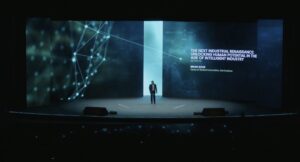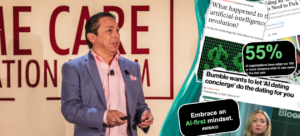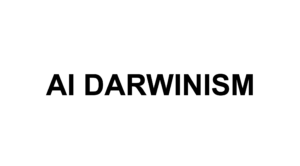
This is the first part in a short series to introduce The End of Business as Usual…
Change is inevitable, but it is rarely easy. Among the greatest difficulties associated with change is the ability to even recognize its need at a time when we can actually do something about it. Sometimes, when we finally realize that change is inevitable, the vision or energy needed to push forward in a new direction is elusive. Or worse, when competitors recognize the need for change before us, we are by default pushed into a precarious position where our next steps become impulsive rather than strategic.
If you follow technology as avidly as I do, we can agree that the volume of emerging technology is both awe-inspiring and overwhelming. As new technology makes its way into into everyday life and workflow, certain devices, applications, and networks disrupt the norm and begin to impact behavior. It is this disruptive technology that over time, influences how people work, communicate, share, or make decisions. The question is at what point does emerging technology or new behavior become disruptive? And more importantly, what systems, processes, and protocol are in place that recognize disruption, assess opportunity, and facilitate the testing of new ideas? The time to answer these questions is now.
The reality is that we live and compete in a perpetual era of Digital Darwinism, the evolution of consumer behavior when society and technology evolve faster than our ability to adapt.
Nothing today is too big to fail nor too small to succeed. Disruption not only faces every business, its effects are already spreading through customer markets and the channels that influence decisions and behavior. What works against you also works for you. And, it is what you do now that defines your ability to compete for today and the future. You already recognize the importance technology plays in your business. That’s why you’re here. But recognizing the difference between emerging and disruptive technology and measuring its impact on your business, customer relationships, and products is a necessary discipline to successfully evolve.
The means to see the need for change is only surpassed by our ability to distinguish opportunities for transformation and innovation. This isn’t just a matter of survival of the fittest, this is a long-term commitment to earning relevance by consistently seeing what others don’t, listening to the needs of customers, and delivering experiences that are worth repeating and sharing.
So, who’s next…to either succeed or fail as a result of disruption? Share your observations, predictions, and reasons in the comments below as they will drive the creation of the next video.
The End of Business as Usual will be available in the coming weeks. You can order now at Amazon | Barnes and Noble | 800CEOREAD.
#AdaptorDie





The technology is giving us superpowers. It creates super heroes and, unfortunately, super villains. It will make for interesting times.
Who’s next? I think everyone, except for Google. And in a very good way. Please note, I worked 17 hours today, so my brain is shot. But, this was my gut reaction and I’ve been told to go with that – so I will.
I’m not sure if this is an actual quote by Einstein or not, regardless, it goes something like this: Society will only survive if it is managed by a group of genius, ethical dictators.
The Googlization of Everything isn’t happening by accident. We’re allowing it to happen. Ethical geniuses? I guess we’ll see.
I forgot to note, if this were to happen, everyone would own a part of Google. The listening movement would be more like the venture capitalist of society. Have a good idea? If it’ll work, for the collective good, you’ll get paid for it. Rather than sending feedback to companies, for free, now.
Too much of a stretch?
Alright, last comment, sorry for the Spam-like action. Ideas could spread like viral videos. Something like Klout (like Klout…. not Klout) would show the originating source of the idea. If it works, people vote it up. You’re social status would be taken out of the equation.
All current technology will be obsolete. Future technolgy for everyday users will be voice and motion activated!
Perhaps for the first time ever we have the opportunity to expand from the one dimensional financial model as a measure of our success and develop towards a ‘Social Currency’ whereby one’s worth is established by a combination of success and contribution. (How much did you contribute as opposed to what are you worth…) So if a Fireman or Doctor saves a life they earn social currency and if a banker destroys lives, he loses social currency. Sounds ‘out there’ but why not? If power were vested to the most generous, maybe the world would be a nicer place!
Since when are economics a biological and evolutionary phenomenon? What to do now as a believer in economic creationism? (Economy is a human invention – just like all other religions).
Very well stated. Just this morning, I was thinking about the latest “burst” of new services. Between Google+, Facebook, the new Delicious, the new Blogger options, and exciting new content curation platforms everywhere, I am indeed overwhelmed by the choices.
At some point soon, I’ll have to pick a couple of teams and stay put. I need to evaluate and advocate for those which make the best strategic sense for my clients and business. Love everything that’s happening, but it’s becoming too easy to spread too thin.
Very well stated. I was just thinking about the latest
“burst” of new services. Between Google+, Facebook, the new Delicious,
the new Blogger options, and exciting new content curation platforms
everywhere, I am indeed overwhelmed by the choices.
At some point soon, I’ll have to pick a couple of teams and stay put. I
need to evaluate and advocate for those which make the best strategic
sense for my clients and business. Love everything that’s happening, but
it’s becoming too easy to spread too thin.
You are putting into words what I’ve been thinking for the last decade. As an anthropologist, I have been mulling over the possibilities of tomorrow for a very long time – wondering, selfishly, where will I fit in, WILL I fit in and if so, HOW? I am swamped with all that is ‘out there,’ and wish for some rapid ‘natural selection’ to occur to weed out the weak. I am overwhelmed and at odds about what to do today, and to think of tomorrow and the years after that? YIKES! Already am drowning in information, misinformation and outright gobbledy-gook mucking up the bandwidths … of my mind.
What is curious is that for the most part – while digital darwinism has been running amok – most businesses have held on to traditional ways of doing business, adding and buying in to “new media” but not really seeing it for its full potential. Instead of understanding that technological disruption has made for the adoption of new behaviors (or old forgotten ones like for instance collaborative consumption, bartering etc) and therefore old rules no longer apply – businesses have stuck by their guns instaed of racking their brains for models of business adapted to our new and sometimes refound behaviors. Business categories find it hard to revisit the consumption line and understand what role they should fill. When people prefer sharing cars over owning them – what does that mean for the car business and how should they revisit their chain so as to fill a new purpose?
Nicely written post, but I would expect you pose some areas / examples (stimuli) of this Changing areas….since you have a “global view”. Otherwise you state the obvious. We expect more from you, not attention catching titles. Thanks you for considering this. Tasos Pagakis
Tasos, it’s a series. This is merely the introduction…as well as the debut for the video.
Great post. Since Clayton Christensen’s “The Innovator’s Dilemma”, many of us have seen these changes up close and personal. The structure of large public companies is, for the most part, dysfunctional when it comes to making a decision to shift resources to an entirely different business. In its day, Nokia was the great exception, shifting from a tire and rubber boot manufacturer to cell phones. I know of no other company that was able to make such a radical shift.
I think the only businesses that survive this “great shift” will be those that have become de-layered — that don’t require the approvals (for every major decision) of IT, Marketing, Branding, etc. up through layers until they reach a CEO. Moore’s law denies us the time for this. By the time these companies decide, external circumstances have changed.I suspect we are headed for looser ecologies of small businesses acting much like organs in a larger organism — each making its own directional decisions — succeeding or failing on its own — able to remain a part of the organism or being discarded like dead cells to be replaced by other companies with smarter management. Each performing specialized functions for large numbers of the smaller businesses — but none ultimately obligated (as in a zaibatsu) to use a vendor within the organism. It will be a interesting structure to figure out but, overall, it is increasingly enabled by SAAS, social media, open source, etc.
I always find your writing extremely thoughtful and am looking forward to the book.
I have been doing some minor (unstructured) research to learn if information overload has a tipping point.
Companies are slow to adapt to any new technology or approach and so as they begin adoption, they also continue the old processes that have gotten them to where they are today. They begin using Facebook, but do not invest in it’s power initially. When we include Twitter, linkedin, Google+ and all of their attendant tools and apps, it begins to become overwhelming.
Next they turn to an expert to help them understand and utilize the new thing. Unfortunately, they are a large number of self proclaimed SM Guru’s out there who don’t have a much better understanding of how to apply the technology or the client’s business to become effective and now the businessman is managing the business, th media aand the GURU…..As the speed of technology increases this all becomes a bit overwhelming and they reaach the “tipping point” of having to abandon or scale back participation. I love your term “Social Stream Fatigue.
The other issue which i will not discuss here is that it is difficult to chew through all the information being presented to find the real nuggest of value.
If I find a calculation for the “tipping point” I will let you know.
Please keep thinking and writing….you are a voice in the wilderness….
Great post, super relevant in the current marketing landscape. Expanded on my thoughts here: http://thedisruptive.wordpress.com/2011/10/03/quick-take-digital-darwinism-whos-next/
Thanks for the discussion!
– Dave / @MarcelloENT
It seems that we are icing through another exciting time where we all must Adjust our Ability to Adapt. I remember when the computer boom in the 80s occurred and EVERYONE was suddenly in the PC business. Suddenly, you could buy a computer to do your own work. Businesses who flied on people needing them for what consumers could now do on their own computers closed f there did not adapt. Then, when desktop publishing came about, EVERYONE was a designer and a publisher. People lost businesses if they did not adapt and leverage the new technology. Typesetters closed if they did not become what was then called “service bureaus” that processed your digital files for you. Those businesses that adapted, thrived. Same for the dot com boom of the late 90s. And now we live change again with the customer having a significant voice in how businesses treat customers, develop products, etc.
In the video with this post, announcements about Borders and Blockbuster closures reflect change in technology and customer needs. What if the Borders and Blockbuster employees who know a lot about the business of books, customers who read, movie lovers, participate in the new companies that put Borders and Blockbuster out of business? Those companies can benefit from their knowledge if the employees out of work can adapt to new ways of doing things within their industry.
what a great post! thanks to the author or sharing this information with
us! appreciate it!
I’ve seen this post when you shared it on Facebook and I left a comment there as well. I think that when it comes to technology, there are many who are still resilient to change – perhaps, it’s innate to fear the ‘unknown’. Then, I think our brains can process just as much and all these changes just give us either an overload or a burnout. Still, I agree with you that ‘Nothing today is too big to fail nor too small to succeed…’
Brian,
I’m looking forward to the book as your posts are always insightful. Netflix is next. Unlike Borders or Blockbuster, it’s an click and mortar. But one that did not listened to what its customer wanted. Netflix’s clients don’t want 2 separate platforms for DVD Vs streaming, they don’t want 2 pricing models instead of one and most importantly, they don’t want to pay 60% more for the service. On the other hand, Netflix has to spend more to acquire movies (soma analysts say X10 in 2012) so it had to act quickly. The bottom line is that Netflix will fail for the same reasons as the other ones: because of its market environment (studios charge big money), but also because of its arrogance: Netflix no lionger listens.
There are many great examples here of companies that have dies as a result of not adapting quickly enough. Are there examples of companies that saw the future and adapted successfully? Can anyone offer good examples of companies that transitioned from non-tech to tech or from print to online or simply innovated themselves in order to survive?
Digital Darwinism is a perfect description of the social media world today. The many changes of Facebook, the emergence of Google+, the decline of MySpace are all examples of the ever changing digital world. Though many are slow to embrace change, without it we wouldn’t be where we were today. There has been quite a bit of negative reaction to the latest round of changes to Facebook, but what if they had never changed the initial requirement of having to be a college student? It would not be what it is today and those very people wouldn’t be using it. Companies have to be ready and willing to evolve in the digital age.
For all the overwhelming changes in tech and the internet, the bandwagoneering and – as you aptly call it – Digital Darwinism I’m amazed at how much the world is the same every day. There is so much inertia in the world and that inertia is already limiting growth and change digitally, in terms of how service is provided and how people behave. I find this comforting, btw. Things can only change so quickly. I’m amazed every morning that I still get stuck in traffic, people are still listening to the radio where I work, they still sit at desks… How much are you over-determining Darwinism (a very simplistic model, I think) and how well do we really understand how change and evolution work and where does inertia fit in to a description of our world?
Brian,
A friend brought your article to my attention and I am glad she did. I have followed you before. Perhaps I should just subscribe. Question…Is Twitter an example of a Technology that was at one time emerging? Is it still evolving? And is it also Disruptive? Is Facebook both as well?
Great question! Yes, during the first year or two, it was definitely “emerging.” Over the last couple of years, it tipped and became disruptive to business (some businesses, not all businesses…at least not yet). p.s. and yes you should subscribe.
great article you have here. I agree that technology is rapidly growing each day and as well as business around it.